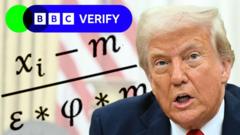The recent announcement by President Trump regarding significant tariffs on imported energy storage technology may severely impede the progress of renewable energy initiatives in the U.S., particularly the integration of large-scale battery systems.
Trump's Tariffs Threaten Growth in Energy Storage Technology

Trump's Tariffs Threaten Growth in Energy Storage Technology
New tariffs challenge the booming battery sector essential for renewable energy integration.
In a move that could disrupt the rapidly expanding energy storage market, President Trump has imposed sweeping tariffs on lithium-ion batteries, which are crucial for harnessing renewable energy sources like wind and solar. This development arrives at a time when companies across America have been heavily investing in battery technology to enhance grid reliability and efficiency.
As battery installations surged in recent years, particularly in states like Texas and California, the need for such technologies has become paramount. These systems store excess renewable energy and make it accessible when production wanes. However, data from BloombergNEF indicates that about 69 percent of the lithium-ion batteries in the U.S. are imported from China.
Following Trump's new measures, a staggering tax rate of 64.5 percent on these batteries will come into effect, escalating to 82 percent next year. “This will throttle U.S. energy storage deployment," warned Jason Burwen, vice president of policy and strategy at battery developer GridStor, underscoring the potential negative implications for business and grid reliability.
Despite the anticipated capacity expansion in energy storage this year, adding a record 18,200 megawatts—equivalent to the output of 18 nuclear reactors for a few hours—the future remains uncertain as companies brace for the financial impact of these tariffs. Such measures threaten to stifle one of the fastest-growing sectors in America's energy landscape.
As battery installations surged in recent years, particularly in states like Texas and California, the need for such technologies has become paramount. These systems store excess renewable energy and make it accessible when production wanes. However, data from BloombergNEF indicates that about 69 percent of the lithium-ion batteries in the U.S. are imported from China.
Following Trump's new measures, a staggering tax rate of 64.5 percent on these batteries will come into effect, escalating to 82 percent next year. “This will throttle U.S. energy storage deployment," warned Jason Burwen, vice president of policy and strategy at battery developer GridStor, underscoring the potential negative implications for business and grid reliability.
Despite the anticipated capacity expansion in energy storage this year, adding a record 18,200 megawatts—equivalent to the output of 18 nuclear reactors for a few hours—the future remains uncertain as companies brace for the financial impact of these tariffs. Such measures threaten to stifle one of the fastest-growing sectors in America's energy landscape.





















